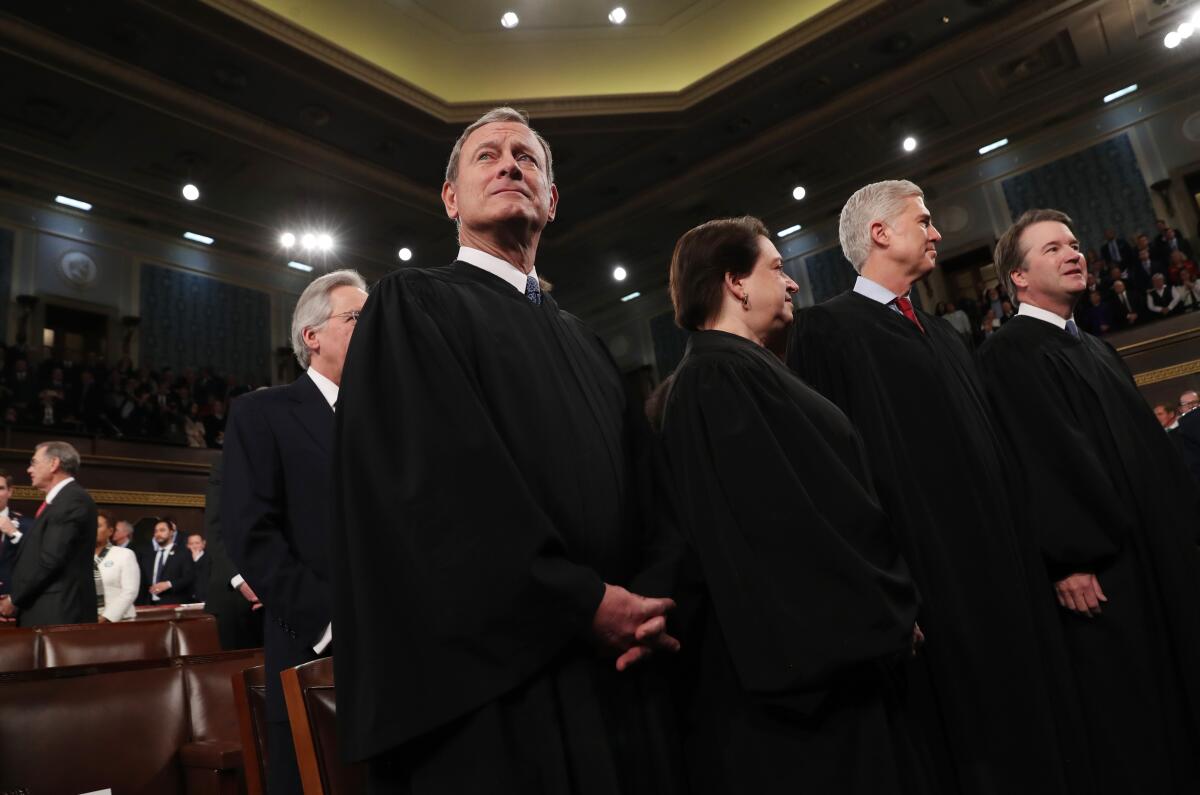President Trump isn’t above the law

- Share via
President Trump has driven many a Democrat to extremes in opposing him; to some, his tax returns and the records of his real estate deals have become the holy grail. But the protection his lawyers sought in the Supreme Court on Tuesday — near total immunity from congressional and state grand jury subpoenas — is an overreach that the justices should reject. Winning the presidency shouldn’t stop the wheels of justice from turning or prevent members of Congress from obtaining the information they need to do their job.
The subpoenas at issue were sparked by the testimony that Trump’s former fixer, Michael Cohen, gave to the House Government Oversight and Intelligence committees in early 2019. Cohen has a lousy track record when it comes to credibility, but he offered such specific evidence about his former client’s alleged financial irregularities that the Government Oversight, Intelligence and Financial Services committees all opened investigations into possible fraud, money laundering and foreign interference in U.S. elections.
The committees sent subpoenas to two banks — Deutsche Bank and Capital One — and the accounting firm Mazars asking for multiple years’ worth of financial records related to Trump, his businesses and his family members. The district attorney’s office for New York County also joined the fray, sending a largely identical subpoena to Mazars, but with the additional demand for eight years’ worth of the president’s tax returns.
Lower federal courts rejected Trump’s challenges to each of the subpoenas, but the Supreme Court put them all on hold so it could hear Trump’s appeals. The issues raised are doozies: How can you avoid opening the floodgates to a slew of politically motivated investigations? How do you balance the president’s need to fulfill his or her constitutional duties against Congress’ need to fix problems in federal laws and local prosecutors’ need to investigate crimes?
It’s worth noting that the congressional subpoenas at issue have nothing to do with Congress’ impeachment power. Instead, they relate to Congress’ power to make laws. Both sides in the case agree that subpoenas have to serve a legitimate legislative purpose, but they disagree sharply over whether the House committees were pursuing one or simply trying to damage Trump.
American history is replete with investigations by lawmakers of one party into presidents of another, probing actions taken by presidents both in and out of office. So it’s a stretch to argue, as Trump’s attorneys did, that the House was now trying to break the bonds of propriety by hoovering up Trump’s financial records from the years before he became president. Scrutiny is not an inherently undue burden for a president. It comes with the territory.
Yet the House’s lawyer, Douglas N. Letter, fumbled when several justices asked if there were any real limits on Congress’ power to subpoena a president’s financial, medical and other personal records. And there should be, given the potential for misuse. Some of the lawmakers who’ve relentlessly pursued Trump’s tax returns, for instance, appear far more eager to unearth embarrassing or incriminating information than to refine the federal tax code.
At the very least, legislators should have to show that the personal records are uniquely pertinent to the legislative matters at issue, the information would be unusually difficult to obtain from other sources, the inquiry is time-sensitive and it wouldn’t interfere with the president’s ability to govern. In other words, they’d have to demonstrate why other records couldn’t substitute for the president’s.
Unlike the House’s subpoenas, the one issued by the New York district attorney as part of a criminal investigation into the president was truly unusual. After all, the Constitution bars presidents from being prosecuted while they’re in office. Trump’s lawyer, Jay Sekulow, argued that the justices should declare any such subpoena to be unconstitutional; otherwise, he argued, local prosecutors would be free to harass the president for parochial political reasons.
But district attorneys can’t investigate alleged crimes outside their jurisdictions, so the idea that hundreds of D.A.’s would launch investigations into a president to score political points is absurd. If they could, they would have done so already. And requiring D.A.s to suspend grand jury investigations until the president leaves office, as Sekulow demanded, could run out the statute of limitations on crimes committed by other people who were involved with the president.
The justices should take the same position they took when they allowed Paula Jones’ lawsuit to continue against President Clinton while he was in office. Rather than adopting a blanket rule against subpoenas, they should evaluate each one as it comes, and balance the needs of lawmakers, prosecutors and presidents to fulfill their constitutional obligation without foreclosing any of them.
More to Read
A cure for the common opinion
Get thought-provoking perspectives with our weekly newsletter.
You may occasionally receive promotional content from the Los Angeles Times.






